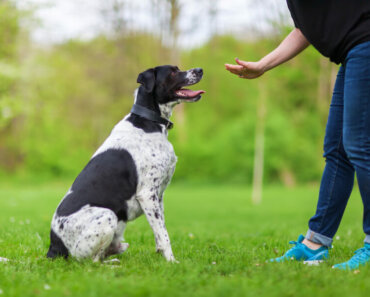The post Acupuncture For Dogs: What You Need To Know by Claire Primo, CVT, ACMT, FFCP appeared first on Dogster. Copying over entire articles infringes on copyright laws. You may not be aware of it, but all of these articles were assigned, contracted and paid for, so they aren’t considered public domain. However, we appreciate that you like the article and would love it if you continued sharing just the first paragraph of an article, then linking out to the rest of the piece on Dogster.com.
In order to know whether acupuncture may be a good fit for your dog, you must first understand what it is and how it works. Acupuncture is a form of traditional Chinese medicine (TCM) that has been practiced for thousands of years and involves the insertion of needles into skin along strategic points or areas of the body.
From the TCM perspective, acupuncture needles are inserted into acupuncture points along the body’s meridians. Using this approach, meridians are pathways in which life energy, also known as chi, flows for balance of this energy. From a Western perspective, acupuncture needles are inserted into acupuncture points to stimulate nerves, connective tissue and muscles. While there are varying approaches to acupuncture depending on the practitioner’s personal approach, the objectives generally remain the same — to stimulate the body’s natural healing ability, therefore promoting an increase in both physical and mental well-being.
Here are some basic things to know about having acupuncture done on your dog, according to Dr. Angie Krause, holistic veterinarian at Boulder Holistic Vet:
- a typical acupuncture session for your dog could last anywhere between 15 and 30 minutes
- a veterinarian inserts needles into your dog’s body in specific acupuncture points using a variety of thin needle sizes
- these needles can stay in your dog for upward of 30 minutes or as little as just a few seconds
- the veterinarian will likely recommend more sessions when your dog is first starting with acupuncture and then taper off, depending on the response to the treatment
- acupuncture sessions can be performed in the comfort of the pet’s home or in the veterinary clinic
Styles of acupuncture for dogs
Many different styles of acupuncture exist. Dry needle acupuncture, the insertion of small needles into the skin, can be done using either a Chinese or Japanese approach. Chinese acupuncture is the more common approach, using slightly larger needles that are inserted into the skin for a longer amount of time (usually between 15 to 30 minutes). Alternatively, Japanese acupuncture tends toward smaller needles that are inserted more superficially and for a shorter duration of time.
While less common than dry needling, both aqua-acupuncture and electro-acupuncture are also becoming more common in veterinary medicine. Aquapuncture is where sterile solubles, commonly B12, are injected into known acupoints. Electro-acupuncture uses electricity to further amplify the purpose and benefits of dry needle acupuncture. Both have great benefit and are generally well tolerated by dogs.
Another augmentation to acupuncture that removes the need for needles is acupressure. Acupressure uses fingers (or other parts of the hand and body) to stimulate acupoints. The great benefit to acupressure on dogs is that pet parents can provide this therapy at home. Many times, they see the same benefits as reached with acupuncture on their dog. This is a great way to empower pup parents!
Benefits of acupuncture for dogs
Benefits of acupuncture for dogs are thought to be similar to those that a human might experience.
These benefits include but are not limited to:
- Decreased healing time. Acupuncture can be used to promote decreased healing time for dogs recovering from acute or chronic injury or post-surgery. This may include soft tissue or ligament injuries or orthopedic surgeries.
- Increased pain control. Whether a dog has orthopedic, neurologic or gastrointestinal pain, acupuncture may aid in decreasing discomfort by better managing pain control. Acupuncture is an excellent complimentary modality that can be easily incorporated with traditional treatment plans.
- Increased mobility. Acupuncture is an excellent option for senior dogs or dogs with chronic mobility changes (such as dogs with amputations, dysplasia or muscle weakness or atrophy). Acupuncture is also a great modality for dogs who cannot handle pharmaceutical pain control options, such as NSAIDs or gabapentin.
- Decrease inflammation. Acupuncture can help manage many different types of inflammation, one such example being inflammation associated with skin allergies. According to a small study done in 2018 regarding skin allergies in humans, acupuncture was seen to stimulate blood flow to specific acupoints that help heal skin lesions, as well as further reduce symptoms associated with eczema, dermatitis and pruritus (itchy skin).
How a dog responds to acupuncture, and for how long, depends entirely on their individual response, as well as pet parent feedback. While some pet parents may not notice any benefits as they relate to acupuncture for their dog, others may notice positive changes for days or even weeks after sessions. Acupuncture is often combined with other bodywork, such as chiropractic, laser therapy or massage therapy, to help prolong benefits.

Things for pet parents to watch for after their dog’s acupuncture session that may help provide insight as to how their dog’s body is responding to the treatment include but are not limited to:
- Appetite. If your dog eats more food after her acupuncture treatment, can you correlate this to anything specific, such as decreased nausea, an increased sense of well-being or decreased pain?
- Water consumption. Many dogs drink more water and urinate more directly after their acupuncture session. This is very normal.
- Mobility. If your dog is able to move easier after acupuncture, this is a great sign. Things to watch out for regarding better mobility include less stiffness after waking, an easier time getting up and down, better range of motion or getting on and off furniture easier.
- Activity levels. If your dog is asking to go on more frequent or longer walks post-acupuncture, this is a great sign. If she is playing with you or other resident pets in the home more frequently, she is probably feeling better.
- Behavior changes. Positive behavioral changes may include your dog seeming more social, comfortable or less distressed overall.
Who can practice acupuncture on dogs?
Regardless of whether you are working with a practitioner who takes a traditional Chinese medicine (TCM) or Western approach, the only legal professional able to perform acupuncture on your dog is a licensed veterinarian, who has completed additional certification and training in acupuncture.
If your veterinarian does not practice acupuncture on animals, she may refer to you a local veterinarian who does, or you can search for practitioners in your local area using the Chi University Alumni Directory here.
Common canine conditions that benefit from acupuncture
Knowing the benefits of using acupuncture for dogs may have helped you determine whether it’s a good option for your pup. However, if you’re still on the fence, this list of common canine conditions that may benefit from the therapy could help you determine if it’s worth exploring for your pup.
Common canine conditions that may respond to acupuncture include but are not limited to:
- Osteoarthritis
- Skin allergies
- Hip or elbow dysplasia
- Spinal cord conditions
- Anxiety or other behavioral challenges
- Side effects from chemotherapy including nausea, low appetite and depression
This is just a small list of conditions that may benefit from the introduction of acupuncture. If you believe your dog has a condition that could be alleviated using this therapy, do not hesitate to ask your veterinarian.
Acupuncture is becoming increasingly popular as a stand-alone modality, or used in conjunction with more traditional treatments for a variety of ailments in dogs. Its cost may prohibit some pup parents from exploring this therapy for their dog, but more pet insurance companies now cover this treatment. With few negative side effects, acupuncture should absolutely be explored for pet parents who have the resources and a pup in need.
The post Acupuncture For Dogs: What You Need To Know by Claire Primo, CVT, ACMT, FFCP appeared first on Dogster. Copying over entire articles infringes on copyright laws. You may not be aware of it, but all of these articles were assigned, contracted and paid for, so they aren’t considered public domain. However, we appreciate that you like the article and would love it if you continued sharing just the first paragraph of an article, then linking out to the rest of the piece on Dogster.com.


























